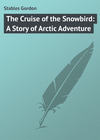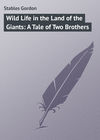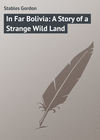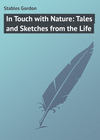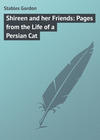Читать книгу: «The Cruise of the Snowbird: A Story of Arctic Adventure»
Chapter One
The Young Chief of Arrandoon – The Rising Storm – Lost in the Snow
It was winter. Allan McGregor stood, gun in hand, leaning against a rock half-way down the mountain-side, and, with the exception of himself and the stately deer-hound that lay at his feet, there was no sign of any living thing in all the glen; and dreary and desolate in the extreme was the landscape all around him. Glentroom in the summer time, when the braes were all green with the feathery birches, and the hillsides ablaze with the purple bloom of the heather, must have been both pleasant and romantic; but the birch-trees were now leafless and bare, the mountains were clad in snow, and the rock-bound lake, that lay far beneath, was leaden and grey like the sky itself, except where its waves were broken into foam by the snow-wind. That snow-wind blew from the north, and there was a sound in its voice, as it sighed through the withered breckans and moaned fitfully among the rocks and crags, that told of a coming storm.
Allan was the young laird of Arrandoon. All the glen had at one time belonged to his ancestors – ay, and all the land that could be seen, and all the lochs that could be counted from the peaks of Ben Lona. His father, but two short years before the commencement of this strange story of adventure, had died, sword in hand, at the head of his regiment in distant Afghan, and left him – what? A few thousand sheep, a few thousand acres of heather land on which to feed them, the title of chief, and yonder ancient castle, where dwelt his widowed mother and his sister.
Although he was a good Highland mile from his home, the castle, visible in every line and lineament from where he stood, formed quite a feature in the landscape. A tall grey building, with many a quaint and curious window, and many a turret chamber, it was built on the spur of the mountain, around which swept a brown hill-stream, the third side, or base of the triangle, being bounded by a moat now dry, and a drawbridge never raised. Far down beneath it was the grey loch, to which the noisy stream was hurrying.
Every old castle has its old story, and Arrandoon was no exception. It had been built in troublous times – built when the wild clans of the McGregors were in their glory. There the chiefs had dwelt, thence had they often sallied to tread the war-path or arouse the chase, and in its ancient halls many a gay revel had been held; but peace with the Lowlands, strange to say, had wrought the downfall of the chiefs of Arrandoon. The country had been thrown open, Englishmen had visited the glens, and friendships had been formed between those who once were deadly foes. In their own Highland homes the McGregors had entertained strangers in a regal fashion. Herein was pride – the pride that goes before a fall. When the chieftains went south, there, too, they would lord it, and herein lay more pride – the pride that caused the fall – for, alas and a lack-a-day! for the want of money land must be sold. Thus the stranger crept into the country of the Gael, and gold did for the proud McGregors, what the sword itself could never achieve – it laid them low.
That was one chapter of this castle’s story; the second is even a sadder one, for it tells of the days when, bereft of their lands, the proud chiefs of the McGregors, scorning trade, placed their claymores at the service of the reigning monarch, and fell in many a foreign land, fighting in a cause that was not their own, because fighting, they thought, was honourable, and fighting gave them bread. And their wives and their little ones were left at home to mourn. But no stranger saw the tears they shed.
It was towards this castle that the eyes of Allan McGregor were turned when first we see him; it was of the mournful history of his family he was thinking, as he stood on the hillside on this bleak, cold wintry evening.
“Bah!” he said to himself, “the very game seem to forsake the glen. Just look here,” he continued, addressing the dog, who looked up, wagging his tail, “only two hares and a brace or two of birds, with a wild cat that we shot at hazard, didn’t we, Bran? And I’m sure we’ve walked fully twenty miles, haven’t we, Bran?”
“Twenty miles fully,” Bran seemed to say, speaking with his eyes and his tail.
“And really, Bran, when my English college friends come to see me – as they will to-night, you know – I’ll hardly have anything to give them to eat, leaving sport out of the question; will I, Bran?”
Bran looked very serious at this, for he knew every inflection of his master’s voice.
“Ah, Bran, Bran! my dear old dog! it is very hard being a Highland chieftain with nothing to support one’s dignity on. Dignity, indeed! Why, Bran, I have positively to put mine in the pot and boil it for dinner. Now rouse up, Bran; I want to speak to you, because I must have somebody to open my heart to.”
Bran sat up on his haunches, and young Allan placed his hand on his head.
“Yes, Bran, my heart seems strangely full of something, and I think, old dog, that it is hope! hope for better times to come. You see our castle home down yonder, Bran?”
The noble hound looked in the direction indicated, and again moved his tail.
“Well, Bran, for many, many years there hasn’t been a single wreath of smoke seen above any of the chimneys of that bonnie old house, except those that rise from the southern wing – the smallest wing, Bran, remember – and all the rest of the castle is going to wreck and ruin. No wonder you half close your eyes, Bran; it is a sad serious business, and fine times the mice and the rats and the owls and the bats have been having in it, I can tell you!
“But now just listen, old fellow! All the time that you have been snoozing among the snow there, with your nose on top of the game-bag, I have been standing here thinking – thinking – thinking.
“You would like to know what I have been thinking about, wouldn’t you? Well, as you’re a good, faithful dog, I’ll tell you. I’ve been thinking about the past, and old, old times, when McGregor of Arrandoon was the proudest chief that ever trod the heather. That is more than a hundred years ago, Bran. The present chief of Arrandoon is a very different sort of an individual. To tell you the truth, my friend, your master is just as poor as peastraw, and there isn’t much substance in that. But, oh! Bran, I’ve been thinking that, what if I myself, by my own exertions, could go somewhere and do something that would earn me wealth and fame? To be sure I would like to be a soldier, but then mother says I must not leave her for the wars, and my poor father fought and bled for twenty long years, and there was nothing to send home but his sword. Heigho! No, I cannot be a soldier, even if I would. But something, Bran, I mean to do; something I mean to be, Bran. I don’t know yet, though, what that something will be, but my mother shall not die in poverty; of that I feel quite certain. Pride caused the fall of the chiefs of Arrandoon; pride shall raise us once again. The song says, —
“‘Whate’er a man dares he can do.’
“And I mean to dare and I mean to do, even if I go off to the gold-diggings. But, oh! Bran, only to think of getting back even a portion of my lands, that are now turned into shooting-grounds for the alien and stranger, to see sheep and lowing kine grazing where now only the heather grows, and the smoke curling upwards once more, from every chimney of our dear old home! Isn’t it a glorious thought, Bran?”
Bran jumped up at once and shook himself. Poor dog! he had no knowledge of a world beyond the glen, and probably the words in his master’s heroic speech that he understood the best, were those about going somewhere and doing something.
So he shook himself, wagged his tail, looked up to the sky, down at the castle, then all round him, and finally up into his master’s face, saying plainly enough, —
“By all means, master. I’m ready if you are. What is it to be – hares, rabbits, deer, or wild cat? I’m ready.”
Young Allan laughed aloud, and again patted the rough honest head of the faithful hound. And a very nice picture he and the dog would, just at that moment, have made, had an artist been there to transfer it to canvas. McGregor was poor, I grant you, but he owned something better even than riches: he had youth and health and beauty – the beauty of manliness, and his were a face and figure that once seen were sure to be remembered.
“Tall and stately, and strong as the oak, graceful as the bending willow,” – this is something like the language that Ossian, or any other ancient Celtic bard, might have used in describing him. I am sorry that I am not a Celtic bard, and that I must content myself with prosaically saying that Allan was handsome, and that the Highland garb which he wore – perhaps the most romantic of all costumes – well became him.
Reader, did ever you run down a mountain-side? I can tell you that it is glorious fun. You must know your mountain well though, and be sure no precipices are in your way. Having made certain of this, off you go, just as Allan and his hound went now, with wild skips, and hops, and jumps; it is not running, it is positive kangarooing, and when you do leave the ground in a leap, you think you will never touch it again. But no fear must dwell in your heart during this mad race. Once commenced, nothing can stop your wild career, till you find yourself at the foot and on level ground; and even then you have to run a goodly distance to expend the impulse that carried you downwards, or else you will tumble. But when you have stopped at last, and gazed upwards, “Is it possible,” you say to yourself, “that I can have descended from such a height in so short a space of time?”
I do not know whether Bran or his master was at the foot of the mountain first, but I do happen to know that they both disappeared in a wreath of snow as soon as they got there, and that both of them emerged therefrom laughing. After that, Allan McGregor sloped his gun and walked on more sedately, as became the chief of Arrandoon.
And now he approached the old castle, which looked ever so much higher and more imposing as one stood beneath it. He fired both barrels of his gun in the air, and the sound reverberated from hill and crag, rolling far away over the loch itself in a thousand echoes, as if the fairies were engaged at platoon-firing. Bran barked, and his bark was re-echoed too, not only from the rocks around, but from the interior of the castle walls. This last, I must tell you, was an Irish echo; it was no ghostly recoil of Bran’s own voice, but the genuine outcome from canine lungs; and lo! yonder come the owners of them, pouring over the bridge, a perfect hairy hurricane, to welcome Bran and his master home. Two Highland collies, a lordly Saint Bernard, a whole pack of what looked like stable brooms, but were in reality Skye terriers, and last, but not least, Bran’s old mother.
When the hubbub and din were somewhat settled, and the greetings over, Allan proceeded to cross the bridge, and McBain, his foster-father, advanced with a kindly smile to meet him.
I must introduce McBain to the reader without more ado – that is, I must give you some idea of his appearance; as to his character, that will develop itself as the story proceeds. He was about the middle height, then, and clad, like Allan, in the Highland dress of McGregor tartan – or plaid, as the English and Lowland Scotch erroneously call it. Though far from old, McBain was grey in beard and furrowed in brow; yet there are but few young men, I ween, who, had they ventured on a tussle with that broad-shouldered, wiry Highlander, would have cared to repeat the experiment for a week to come at least.
This was Allan’s foster-father. He had been in the family since he was a child, and his ancestors, like himself, had been chief retainers to the lairds of Arrandoon. He was a right faithful fellow, and a Scotchman in everything, thinking no people so good or brave or powerful as his own, nor any other country in the world worth living in; and from this you will readily infer that he had never mixed very much with the peoples of the earth. This is true; and still he had travelled when a young man, but it was towards the desolate regions of the North Pole. It was pride had taken him there – a cross word that his father had said to him, and young McBain had gone to sea. Only, a few years of the wild, rough life he had led on the icy ocean around Spitzbergen had taught him that there was no place like home, so he returned to it and received his father’s pardon, and, later on, his blessing.
“Aha, Allan, boy!” cried McBain; “so you’ve got back at last. Indeed – indeed we thought you were lost, and Bran and all. What sport, boy – what sport?”
“There is the bag,” said Allan, “and precious little you’ll find in it.”
“Ah! But, boy, half a loaf is better than no bread. When I was in Spitzbergen – ”
“There, there,” said Allan, interrupting him, “never mind about Spitzbergen now; but tell me, have Ralph and Rory come, there’s a good old foster-father.”
“Ralph and Rory come!” replied McBain, with an air of surprise. “Why, they are English, Allan; and do you think they’d leave the hospitality and good cheer of an Inverness hotel, to visit Glentroom in such weather as this? It isn’t likely!”
Allan was silent; he had turned away his head and was gazing skywards, with something very like a frown on his face.
McBain laid a kindly hand on his shoulder. “You are piqued, son,” he said; “you are angry. There is the proud, defiant look of the McGregor chiefs on your countenance. Let it pass, Allan; let it pass. Do not forget for a moment what the McBains have ever been to your people. Have they not served them well, and fought and bled for them too? Were they not ever the first at the castle walls, when the fiery cross was sent through the glen? Do not forget that I have been a true foster-father to you, my son? Haven’t I taught you all you know? on the hills, on the lochs, and by the river? and would you get angry with the old man because he says your guests will hardly dare turn up to-night?”
Allan passed his hand quickly across his brow, as if to brush away a cloud.
“No, no!” he replied; “I’m not angry. Only – only you don’t know my English friends; you will alter your opinion of them when you do. They are brave and manly fellows, McBain. Ralph rowed stroke oar in his boat at Cambridge, and Rory is the best bowler in the three royal counties.”
McBain laughed.
“Allan! Allan!” he said; “think you for a moment they could do what I have taught you to do? Could either of them cross Loch Kreenan in a cobble when the waves are houses high, when their white crests cut the face like a Highland dirk? Could they bring the eagle from the clouds with a single bullet, or the windhover from the sky? Could they grapple with and gralloch a wounded red deer? Nay; and even if they could, if they were as brave and strong and fierce as the wild cat of the mountain, it would take all their strength and all their courage to face the storm that is brewing to-night. See, Allan, the clouds are already settling down on the hills, the peak of Melfourvounie is buried in mist, there is a mournful sough in the rising wind, and ere five hours are over the boddach will be shrieking among the crags of Drontheim.”
(Boddach – A spirit, believed in by many, who takes the shape of an old man, sometimes seen by night in the woods, but always heard shrieking among the rocks that he haunts whenever storms are raging.)
“All the more reason,” cried Allan, talking rapidly, “that I should go and meet them. Tell mother and sister I have gone a little way down the glen to meet Ralph and Rory, and we’ll all be back to dinner. Bran and Oscar will go with me. But stay, don’t you hear the bagpipes? It is Peter, and very likely my friends are with him.”
The sound came nearer and nearer, and presently out from the shadows of the dark pine-wood strode Peter – all alone.
Both went quickly to meet him, and Peter’s story was soon told.
“The Sassenach gentlemans,” he said, “had both left Inverness with him in the morning, and fine young gentlemans they were, and might have been Highlanders for the matter of that. But och and och! they would take the high road for sake of the scenery, bless you, and he had to take the low; but for all that they ought to have been at the castle hours and hours ago.”
Young Allan and his foster-father said never a word; they did but tighten their hands, and glance for a moment in each other’s eyes, yet both understood that the simple action implied a promise on either side to stand together, shoulder to shoulder, whatever might happen.
Presence of mind in emergency is a gift that seems peculiar to the Scottish Highlander. Born in a mountain land, and accustomed from his very infancy to face every danger in hill or glen, in flood or fell or field, his true character is never better seen than in times of danger. McBain waited for a few minutes in the castle courtyard until Allan, who had hurried away, should have time to communicate with his mother and sister; then he struck a gong, and while yet its thunders were reverberating among the hills, he was surrounded by every servant in the place, old Janet, the cook, not excepted; then the orders that fell calmly and yet quickly from his lips showed at once that he was master of the situation.
“Janet, old woman,” he said, “run away to the house like a good creature and get ready the dinner; the best that ever you made, do ye hear? Peter, run, lad, and get a rope, the crooks, and lanterns. Here, take the chief’s gun. Yes, certainly, bring the bagpipes, and don’t forget the flask. Donald Ogg, get the pony put in the trap, with rugs and plaids galore. Take the high road to Inverness and follow us soon. Thank you, Peter. Now for the dogs. No, no; not a pack. Back with them all to the kennel save Oscar, Bran, and Kooran the collie. Here we are, Allan, boy, all ready for a start.”
And in less time than it takes me to tell it, the little expedition was equipped and started. A few minutes more and they had disappeared in the pine forest from which Peter had so lately emerged, and the old Castle of Arrandoon was left to silence and the gloom of quickly-descending night.
Chapter Two
Saved – Rory and Ralph – McBain has an Idea
There is probably no music in the world more spirit-stirring – when heard amongst the native hills – than that of the Highland bagpipe. How often it has led our Scottish troops to victory, and cheered their drooping hearts in times of trouble, let history tell. In the London streets the sound of the pipes may be something vastly different, and then the pipers get undue blame.
The little party who left the Castle of Arrandoon to go in search of Ralph and Rory did well to have Peter and his bagpipes included in their number, for, so long as they were within hearing distance of the castle, the music would give hope to those left behind; and when beyond that, it would not only serve to while away the time of the searchers, but even in the darkness it might perchance be heard by the sought.
The road they had taken led upwards through the pine forest for more than a mile, and even when it left the wood it still ascended, until it at last joined the old highway to Inverness. This was quite high up among the mountains – so high, indeed, that even the most distant peaks were visible on the other side of the lake.
“Surely,” said McBain, “we shall meet your friends ere long.”
“I fear the very worst,” said Allan, gloomily, “for, had they not left the road for some purpose or another, they would have reached the glen long before this time. Rory would have his sketch-book, and both of them are fond of wild scenery.”
“Wild scenery indeed!” said McBain; “they needn’t leave the road to search for that.”
His words were surely true, for a grander scene than that around them it would be difficult to imagine.
It was a toilsome road they had to trace though, for the untrodden snow lay a good foot deep on the path, and, albeit they cast many a longing look ahead, they had but little time and little heart to look around to admire the scenery. And the snow was dry and treacherous. It lay lightly on the brae-sides, and on the bending heather stems, apparently awaiting only the breath of the storm to raise it into clouds of whirling drift, and drive it into deep and impassable wreaths.
For more than an hour they trudged onwards without catching sight or hearing sound of life, whether of man, or bird, or beast. The wind, too, was beginning to rise, a few flakes of snow had begun to fall, and night and darkness were already settling down in the hollows and glens, and only on the hilltops did daylight remain.
At last they came to a shepherd’s hut, and McBain knocked loudly at the door.
“Are you in, Donald? Are you in?” he cried.
“To be surely I’m in,” said a tall, plaided Highlander, opening the little door; “to be surely I’m in, Mr McBain, and where else is it I’d be, I wonder, in such a night as it soon will be?”
“Have you been abroad to-day, Donald?” asked Allan.
“Abroad? Yes, looking after the sheepies, to be surely.”
“Have you seen or met any one?”
“Yes, yes; two English bodies, to be surely. One would be sitting on a stone, making a picture, and the other would be looking over his shoulder, as it were. Och! Yes, to be surely.”
“Would you go with us, Donald?” asked Allan, “and show us the spot where you saw them.”
“Would I go with you? Is it that you are asking me?” cried Donald; “and what for do you ask me? Why didn’t you tell us to go? Didn’t my poor brother go with your father? ay, and die by his side. Yes, Donald will go with you to the end of the world if you’ll want him. Wait till I get my crook; to be surely I’ll go.”
Donald disappeared as he spoke, but after about a minute he joined our friends, and they journeyed on together.
“It will be an awful night, to be surely,” said Donald, “and troth, it is more than likely the two English bodies are dead, or drowned, or frozen by this time. An’ och! it’s a blessing they are only English bodies.”
Such a speech as this did not tend to reassure young Allan. In very truth it almost quenched the hopes that were beginning to rise in his heart.
Donald was now their guide, and they were not surprised to observe that before very long he deserted the main road entirely, for a steep and craggy path that led downwards towards the distant lake. Along this narrow footway Donald bounded along with almost the speed of a red deer. Nor were Allan and his trusty companions slow to follow, for all felt how precious were the few minutes of daylight that were left to them.
And now the shepherd stops, removes his cap, and, passing his fingers through his hair in a puzzled kind of manner, stares around him in some surprise.
“Yes, yes,” he says at last; “this is the place, to be surely, but I don’t see a sign of the English bodies whatsomever.”
But if he does not, Allan McGregor, quicker of eye, does. He springs lightly forward, and picks something up that lies half-buried among the snow.
“It is Rory’s sketch-book,” he says, “Alas! poor Rory.”
But what is that mournful wail that now rises up towards them, apparently from the very bosom of the dark lake itself?
“It’s the boddach of Drontheim,” falters the shepherd, trembling like an aspen leaf. “It’s the boddach, to be surely, och! and och! What will become of us whatsomever?”
“Silence, Donald, silence?” cries McBain, as the strange sound falls once more on their listening ears. “Where is Oscar? Not here? Why, it is he! Come, men! Come, Allan, for, dead or alive, your friends are down yonder.”
They follow the footprints of the noble dog, although they are hardly visible, but Kooran, the collie, takes up the scent and does excellent service. So down the steep and craggy hill they rush, often stumbling, sometimes falling, but still going bravely on, and cheering Oscar with their voices as they run. At the foot at last, and on level ground, they hasten forward, welcomed by the Saint Bernard to a spot where lie two inanimate human forms, partly hidden by the lightly drifting snow.
Dead? No, thank Heaven! they are not dead, and what joy for Allan McGregor, when stalwart Ralph sits up, rubs his eyes, and gazes vacantly and wildly around him.
“Drink,” says McBain, holding a flask to his lips. The young Englishman swallows a mouthful almost mechanically, then staggers to his feet Allan and McBain steady him by the arms till he comes a little more to himself.
“Ralph, old fellow,” says Allan, “don’t you know me?”
“Yes, yes,” he mutters, hardly yet sensible of his surroundings, “I remember all now. Rory – the cliff – I could not raise him – sleep stole my senses away. But we are saved, are we not, and by you, good Allan, and by you strangers? But see to Rory, see to Rory.”
McBain was chafing Rory’s hands, and rubbing his half-frozen limbs.
“No,” he said, “not saved by us. You have Providence to thank, and yonder brave dog. Had he not found you, the sleep that had overcome you would have been your last.”
It was a long time, and it seemed doubly long to Allan and Ralph, ere Rory showed the slightest signs of returning life. At length, however, the blood began to trickle slowly from a wound he had received in the forehead in his fall over the cliff, and next moment he sighed deeply, then opened his eyes.
“God be praised?” said McBain, fervently; “and now, my friends, let us carry him.”
This was very easily done, for Rory was a light weight. So with Donald in front, and the dogs capering and barking all around them, the party commenced the ascent, and half-an-hour afterwards they were safe at the shepherd’s hut. And none too soon, for night was now over all the land, and the snow fell thick and fast.
Rory was laid upon the shepherd’s dais, and Allan and Donald proposed moving it close to the fire. But McBain knew better.
“No, no, no!” he cried, “leave him where he is. Never take a frozen man near the fire. I learned that at Spitzbergen. He has young blood in his veins, and will soon come round.”
But Rory, for a time, lay quiet enough. He was very white too, and but for his regular and uninterrupted breathing, and the tinge of red in his lips, one might have thought him dead.
“Poor little Rory!” said Allan, smoothing his dark hair from off his brow. “How cold his forehead is!”
Very simple words these were, yet there was something in the very tone in which they were uttered that would have convinced even a stranger, that Allan McGregor bore for the youth before him quite a brother’s love.
And who was Rory, and who was Ralph? These questions are very soon answered. Roderick Elphinston and Ralph Leigh were, or had been, students at the University of Cambridge. They had been “inseparables” all through the curriculum, and firm friends from the very first day they had met together. And yet in appearance, and indeed in character, they were entirely different. Ralph was a great broad-shouldered, pleasant-faced young Saxon Rory was small as to stature, but lithe and wiry in the extreme; his face was always somewhat pale, but his eyes had all the glitter and fire of a wild cat in them. Well, then, if you do not like the “wild cat,” I shall say “poet” – the glitter and fire of a poet. And a poet he was, though he seldom wrote verses. Oh! it is not always the verses one writes that prove him to be a poet. Very often it is just the reverse. I know a young man who has written more verses than would stretch from Reading to Hyde Park, and there is just as much poetry in that young man’s soul as there is in the flagstaff on my lawn yonder. But Rory’s soul was filled with life and imagination, a gladsome glowing life that could not be restrained, but that burst upwards like a fountain in the sunlight, giving joy to all around. Everything in nature was understood and loved by Rory, and everything in nature seemed to love him in return; the birds and beasts made a confidant of him, and the very trees and the tenderest flowerets in garden or field seemed to whisper to him and tell him all their secrets. And just because he was so full of life he was also full of fun.
When silent and thinking, this young Irishman’s face was placid, and even somewhat melancholy in expression, but it lighted up when he spoke, and it was wonderfully quick in its changes from grave to gay, or gay to grave. It was like a rippling summer sea with cloud-shadows chasing each other all over it. Like most of his countrymen, Rory was brave even to a fault. Well, then, there you have his description in a few words, and if you will not let me call him poet, I really do not know what else to call him.
Ralph Leigh I must dismiss with a word. But, in a word, he was in my opinion everything that a young English gentleman should be; he was straightforward, bold and manly, and though very far from being as clever as Rory, he loved Rory for possessing the qualities he himself was deficient in. Thoroughly guileless was honest Ralph, and indeed, if the truth must be told, he was not a little proud of his companion, and he was never better pleased than when, along with Rory in the company of others, the Irishman was what Ralph called “in fine form.”
At such times Ralph would not have interrupted the flow of Rory’s wit for the world, but the quiet and happy glance he would give round the room occasionally, to see if other people were listening to and fully appreciating his adopted brother, spoke volumes.
McBain was right. The young blood in Rory’s veins soon reasserted itself, and after half-an-hour’s rest he seemed as well as ever. His first action on awaking was to put his hand to his brow, and his first words were, —
“What is it at all, and where am I? Have I been in any trouble?”
“Trouble, Rory?” said Allan, pressing his hand. “Well, you and Ralph went tumbling over a cliff.”
“Only fifty feet of a fall, Rory,” said Ralph.
Покупайте книги и получайте бонусы в Литрес, Читай-городе и Буквоеде.
Участвовать в бонусной программе
